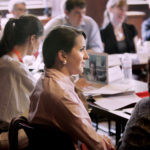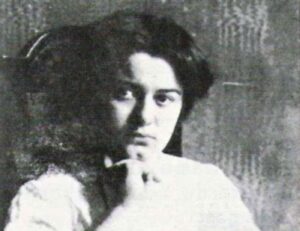I was a graduate student when I first picked up the iconic red volume of the English edition of the French Dominican priest A. G. Sertillanges’s 1921 book, The Intellectual Life. Beloved by priests, professors, and armchair intellectuals, Sertillanges takes a spiritual approach to the work of the scholar. The book is both mindful of the eternal and attuned to the myriad practical details that support the life of the mind.
Around the same time that I began reading The Intellectual Life, I recall walking into a student lounge to microwave my lunch and noticing that a friend was poring over his own copy.
“Abby, this section is for you, take note,” he said, waving me over and proceeding to read Sertillanges’s exhortation to the wife of the intellectual.
“The wife of an intellectual,” he read, “has a mission that it is perhaps well to point out; it so often happens that she forgets it, and, instead of being Beatrice, succeeds in being merely a spendthrift and a chatterbox.”
Start your day with Public Discourse
Sign up and get our daily essays sent straight to your inbox.He laughed, knowing that I am anything but a chatterbox, before continuing:
Every woman should espouse the career of her husband; the father’s toil is always the center of gravity of the family. In that is productive life, and therefore also essential duty. And this is all the truer as the career embraced is nobler and more laborious. In such a case life in common centers round something very lofty; the wife should take her stand on its height, instead of trying to draw the man’s thought down from it.
At the time, I merely rolled my eyes and shot back a retort about the duties of the husband married to an intellectual. But his jest percolated in the back of my mind. Indeed, as I continued my own reading of Sertillanges, I noticed increasingly the ways in which his vision of the intellectual life seemed incompatible with the lives of many of the intelligent women I knew and admired. Today, having left the academic world to care for a young family of my own, this tension is even more apparent to me.
My intention here is not to denigrate Sertillanges’s work, which is excellent on the whole. Even the passages cited above contain a fair degree of prudent advice, even as his characterization of wives is perhaps a little unkind. But there is need for a treatment of the intellectual life that does not assume the possibility—or even the desirability—of withdrawal from the demands and interruptions of children. Sertillanges acknowledges that the intellectual can derive from his children “strength, inspiration, and one of the forms of his ideal.” But he also describes the way in which they “now and then tease and tax” the father—who is evidently not responsible for the daily details of their care.
Finally, in Word on Fire’s September 2022 release, With All Her Mind: A Call to the Intellectual Life, I found such a treatment. The slim hardback volume, edited by Rachel Bulman, is a collection of essays by women from a wide variety of states in life: religious sisters, homeschooling mothers, successful academics.
These essays tend to fall into one of two categories. The first contains affirmations that the intellectual life is indeed for you—even if you are not engaged in formal academic work, even if your hands are full with babies to feed and dishes to wash. The second contains practical and spiritual advice on cultivating the virtues and the habits of an intellectual, from academics young and established, religious sisters, and wives and mothers. The result is a book that both calls its reader to greater spiritual perfection and provides concrete encouragement for her daily life.
The Inclusivity of the Intellectual Life
Christian women are accustomed, even now, to being made to feel small by those who assert that the vocation of a woman must look one specific way. Feeling victimized by those who would try brashly to narrow our understanding of feminine vocation, many women proceed defensively to wield the choices that they have made for themselves and their families against their fellow women.
With All Her Mind, in compiling the hard-won wisdom of women from many different states in and ways of life, encourages its reader to cultivate compassion toward women whose balances of work, family, children, and study look different from her own. The intellectual life need not be a source of competition among women, but instead ought to find a place in each of our lives.
In encouraging every woman to accept the calling to the intellectual life, With All Her Mind focuses perhaps most intensely on those women who have left the traditional workplace in order to stay at home with their children. This is not to the exclusion of working mothers or young professionals or tenured faculty members or women without children. Instead, I think it reflects the reality that these women are most likely to exclude themselves from the conversation about women and the life of the mind.
The intellectual life need not be a source of competition among women, but instead ought to find a place in each of our lives.
“How do I even find time to cultivate a reading life beyond reading The Runaway Bunny over and over again?” she might ask. “And if I do, oughtn’t I feel guilty for taking time away from the work of caring for my children and for my home?”
Rachel Bulman addresses this mindset in her introductory essay, in which she describes her hope that With All Her Mind will be read especially “by young mothers, young career women, college students, and even high school students.” Bulman acknowledges that women drawn to the intellectual life tend especially to be tempted to let the perfect be the enemy of the good.
“I know that one of my greatest obstacles to enriching my mind is the lie that, in order to think, I must devote myself to hours of reading and some sort of academic work,” she writes. For those whose vocational obligations—whether at work or in the home—do not include such activities, the intellectual life can seem out of reach. But it needn’t be.
In fact, those women who feel that the intellectual sphere has no space for them might be suited in a special way for the life of the mind. In her contribution to this volume, “The Joy of Thinking,” Emily Stimpson Chapman recounts her growth from a precocious child into a young woman who craved the good opinion of teachers. She shares how the “desire for praise slowly overtook delight as [her] primary motivation for reading.”
This drive for success did not satisfy her, however, and she ended up dropping out of graduate school. It was not until her reversion to the Catholic faith years later that she rediscovered the delight of learning for the sheer love of it: “I wasn’t pursuing a career. I wasn’t seeking a certain grade. I wasn’t doing what my parents, professors, or bosses wanted me to do. I was reading because I wanted to read. I was reading because I wanted to learn more and understand more.”
Women whose days are filled to the brim with diaper changes and carpool lines are freed from the temptation to turn the intellectual life into a metric of success. Instead, we are able—in the time we are able to cobble together—to pursue truth for its own sake.
Jennifer Frey, recently appointed the inaugural dean of the Honors College at the University of Tulsa, argues in her contribution to this volume that women uniquely combat the “workism” that is so prevalent in our culture. As a result of our near-idolatry of work and productivity, we tend to define leisure only in relation to it. Leisure therefore becomes merely the period of rest and relaxation necessary in order to dive full-throttle back into our work. “Nor is this mentality confined to the breadwinner of the family,” Frey writes. “[Stay-at-home] mothers can also define the value of their lives in terms of purposeful domestic work, which never seems to end.”
She cites John Paul II’s Letter to Women, in which he argues that “a greater presence of women in society . . . will force systems to be redesigned in a way which favors the processes of humanization which mark the ‘civilization of love.’” Leisure entails a receptive taking delight in the true, the good, and the beautiful. Frey highlights the fact that Catholic tradition points to a woman as the most perfect example of proper leisure: “Mary spent a life in earthly contemplation of the highest earthly object—the face of her son, Jesus Christ.”
Why does John Paul II think that women have a unique ability to model leisure? Frey argues that it is because “women, as mothers, teachers, and caregivers, have a natural closeness and special bond to children, who are creatures for whom work is alien and leisure natural.” The intellectual life is not meant to be an anxious, grasping pursuit but rather the contemplation of a worthy subject. I know that my own ability to contemplate in this way has only increased as I have observed the simple, dependent posture of my son. In him, I am able to see more clearly what the beatified life will someday—God willing—look like.
Women need the intellectual life, and our society needs women to pursue it. Fulton J. Sheen famously said that “the history of civilization could actually be written in terms of the level of its women.” If we recognize the importance of a society that takes delight in truth, goodness, and beauty, then we ought to look to women to show us the way.
The intellectual life is not meant to be an anxious, grasping pursuit but rather the contemplation of a worthy subject.
Intellectual Habits for Busy Lives
Even once we recognize the possibility and desirability of pursuing the intellectual life regardless of our primary vocation or day job, we often remain stymied by the realities of our day-to-day life. Thus, many of the contributors to With All Her Mind provide in their essays practical advice and encouragement for cultivating the intellectual life amid the demands of children and families.
Tsh Oxenreider shares her own experience of how the intellectual life can support and enliven a woman’s vocation as wife and mother, recounting that her writing career began as a refuge from the scourge of postpartum depression. Encouraged by a therapist to take up a hobby, she started journaling and then blogging. Now, she is the author of several books. “Making space for my words cleared space in my mind, which breathed much-needed life into my soul,” Oxenreider writes. “I became more present in my daily life. I became more myself.”
Writing is worthwhile even for those who harbor no aspirations for publication or recognition of their words. It gives women a place to work through their thoughts, to grow in wisdom, and to cultivate an imagination that is better prepared to meet the challenges of her daily life with courage.
The same can be said of reading, as Haley Stewart does in her essay on “Becoming a Bibliophile.” Stewart prefaces her love letter to the reading life with a quotation from the play Shadowlands: “We read to know we’re not alone.” In this day and age, both women and men are plagued by loneliness. Women in various stations in life experience feelings of isolation equally: the twenty-something watching all of her friends get married, the married woman aching for a baby while looking at a negative pregnancy test, and the stay-at-home mom desperately missing interaction with other adults. While many turn to social media in order to ease their loneliness, studies suggest that the internet only exacerbates feelings of disconnection.
In the pages of books, however, we can have fellowship with the greatest minds from across the centuries. “Through the gift of books we can ‘speak’ with others through pages written on the other side of the world hundreds of years ago,” Stewart writes. Even a few pages stolen while holding a sleeping baby or while sitting on the metro will enrich our lives—a lot more than scrolling through Instagram will, at any rate. As children get older, families can work to build a habit of reading together—whether this looks like parents reading aloud or each member silently reading his or her own book. I have benefited greatly from holding a virtual book club with friends who live far away—both as a way of sharing something I love with friends and as a way of finally getting through some of the longer tomes on my to-read list.
When we offer our “unremarkable work” to God, we acknowledge that we do not need to write books or stop wars in order to receive His love.
But the intellectual life is not merely a retreat from the demands of home, work, and family. Instead, as Leah Libresco Sargeant considers in her essay “Pursuit in the Drudgery,” even the hidden, repetitive tasks of our daily lives can themselves be an experience of growth and life. Sargeant observes in her young daughter a delight in the monotony of everyday actions. For her, this calls to mind the attitude toward work espoused by St. Josemaria Escriva, who wrote that “[before] God, no occupation is in itself great or small. Everything gains the value of the Love with which it is done.”
When we offer our “unremarkable work” to God, we acknowledge that we do not need to write books or stop wars in order to receive His love. As Sargeant writes, “If we can invite him into our dullest moments, our least exciting tasks, and our monotony, we will have fewer spaces where we feel abandoned by him or that we are tempted to hide from him. Our quiet, not-obviously-interesting work is practice in remembering that our whole lives are his.”
John Paul II, in his Letter to Women, goes through various categories of women and thanks them for their contributions to the world and to the Church: wives, mothers, educators, working women, consecrated women. He considers the women who have demonstrated heroic virtue and brilliant intellect, women like Saints Teresa of Avila and Catherine of Siena. But he closes with praise for ordinary women, those who “reveal the gift of their womanhood by placing themselves at the service of others in their everyday lives.”
As conservatives, we tend to praise those—admittedly praiseworthy—women like Amy Coney Barrett who manage to “have it all.” This sometimes results in implicit denigration of the intellectual capabilities of those women who have chosen not to, who have withdrawn from professional and academic spaces.
Indeed, though conservatives who have achieved professional or academic success do praise the work that women do within the home, they too often condescend to it as simple or less important. With All Her Mind makes abundantly clear that the homeschooling mother of eleven can be just as much called to the intellectual life as the president of a university, providing not a criticism of Sertillanges but a widening of his vision that will benefit women and men alike.













